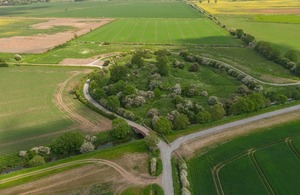
Castlehill Aquagreen is a key part of the second phase of the £28 million pound Holderness Drain Flood Alleviation Scheme which when fully complete, will reduce the risk of flooding for over 800 homes in Sutton and North Carr by storing water during times of flood.
Plans for the second phase of the aquagreen project were approved and planning permission granted by Hull City Council and East Riding of Yorkshire in 2022, with construction starting in the spring /summer of that year.
The aquagreen, south of the old Bransholme Dairy Farm, like aquagreens in other parts of Hull, will be dry in normal weather but can store water when conditions demand it.
Once the peak of a flood event has passed, the site will release water slowly back into Holderness Drain.
Additional benefits resulting from the scheme include the creation of green space for people to enjoy and work done to protect, and improve access to, the Castle Hill ancient monument.
Children from Biggin Hill Primary School helped design illustrations for information boards for the site and the local community helped with the planting of thousands of trees on the site last year.
Andrew Barron, Flood Risk Advisor for the Environment Agency, said:
“This scheme doesn’t just reduce flood risk for hundreds of homes in the area, it also brings a range of social and environmental benefits to the area, including improved access for visitors and new habitats for wildlife.”
A further key part of the Holderness Drain Flood Alleviation Scheme is a new pumping station in East Hull, which has been formally commissioned in recent months.
The fully automated station has the capacity to pump more than 7.5 cubic metres of water per second out of the Holderness Drain into the Humber Estuary and was in operation through last winter.
Together, both components of the scheme will reduce the risk of flooding to neighbourhoods on the eastern side of Hull and provide a long-term, more sustainable approach to managing water in the Holderness Drain catchment.
The Castlehill Aquagreen is a partnership project led by the Environment Agency and supported by Hull City Council, East Riding of Yorkshire Council, National Highways and the former Humber Local Enterprise Partnership’s (LEP) Local Growth Fund Programme, now the HEY Business Growth & Skill Hub.
By working together with both councils and the LEP, the Environment Agency was able to purchase the land in advance of the scheme, which enabled the scheme to progress more easily.
Funding contributions from these organisations, as well as by National Highways and the Yorkshire Regional Flood and Coastal Committee, not only enabled the scheme to address flood risk issues, but it also provided significant wider environmental enhancements for the benefit of the local community.
Rachel Glossop, flood risk manager at Hull City Council, said:
“The council is proud to have been a partner on this project. It aligns with its policies of tackling climate change, working with nature and reducing flood risk to our residents by developing a multiple benefit scheme providing much needed habitat and water storage.”



